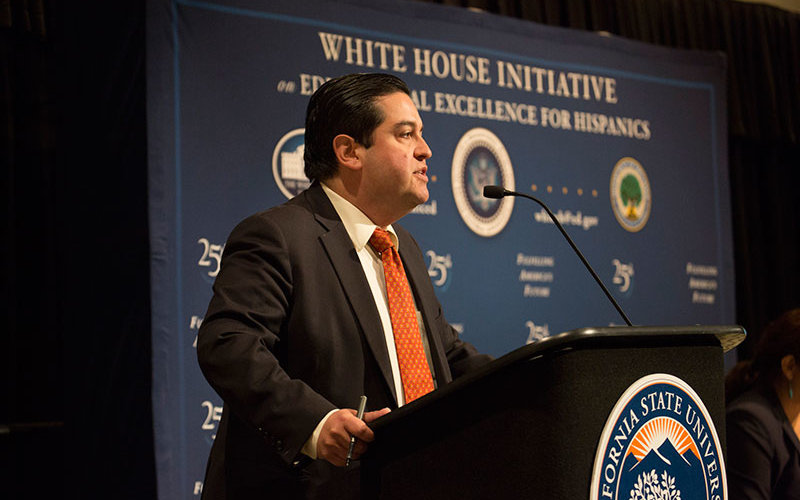
Ensuring equity in education, looking at a Hispanic education legacy and discussing the landmark civil rights case that led to ending racial segregation in the nation’s schools were among the topics addressed at the spring 2016 meeting of the President’s Advisory Commission on Educational Excellence for Hispanics.
Cal State Fullerton President Mildred García, a member of the commission, welcomed other commission members and the general public. She pointed out that Cal State Fullerton is number one in California and fifth in the nation in baccalaureate degrees awarded to Hispanics.
“Over the past three years, we’ve lowered the University’s historically achievement gap by three full percentage points, and eliminated the achievement gap for transfer students,” she said. “Much of the work that’s led to this success is grounded in the tenets upon which President Obama appointed the commission and its subcommittees: Early learning, K-12 education and postsecondary education for Hispanics. Cal State Fullerton’s faculty, staff and students are actively engaged in all of these efforts in numerous ways.”
She also lauded the work of the commission, pointing out that their work improves the quality of education for all students, as well as Latino and underrepresented students, by highlighting areas that needed improvement and implementing change to create significant progress.
“I am thrilled to discuss the important work led by the commission in support of the President and on behalf of the Latino community,” she said. “Our members have contributed to the national discourse on civil rights for Latinos and collectively, the commission has brought to light the challenges that persist for our youth — from a lack of resources in our classrooms, lack of diversity in the teaching profession, the stagnant college completion rate for some of our Latino groups — while also highlighting significant progress, from increased participation in early learning programs to decreases in high school drop-out rates and increased college enrollment rates.
“We are honored that these talented individuals have chosen to work for the benefit of our country,” she said.
Later in the afternoon, CSUF students Joseph Valencia, an art-art history major, and Amanda Martinez, a political science major, who facilitated a discussion with civil rights leader Sylvia Mendez. Mendez, a Presidential Medal of Freedom recipient, was only nine years old when her family won the 1947 landmark case, Mendez vs. Westminster, that desegregated public schools and set the foundation for the historic Brown v. Board of Education case.
“Work still needs to be done in order to ensure that every student, regardless of background, is deserving of a high-quality education,” Mendez told the audience. “We need to ensure that all students, in particular minority, low-income, undocumented and first-generation students, have access to a quality education and that their civil rights guaranteeing that access are protected.
“My parents became involved when they tried to enroll me in the ‘white’ school and we were told to go to the ‘Mexican’ school,” she said. “My father went to an attorney and they finally agreed that what they needed to do was file a class action suit. My mother always said, ‘You don’t just fight for your children — you fight for all children.’”
Today, Mendez still sees defacto segregation based on poverty or geography.
“There are two schools named after my parents and enrollment at both are 100 percent Hispanic,” she said. “We need ensure that students from poorer communities receive the same benefits as children who attend schools that are well-funded — AP classes, academic counseling, good teachers. We need to encourage our children in their efforts to go on to college and make sure they have the skills and support they need.
“And we need students to get out and vote,” she said. “There are people who still say terrible things about Hispanics. Some of it sounds like what we heard in the 1940s — ‘they’re dirty, socially inept, these kids can’t succeed in AP courses.’ Of course, we know that’s not true. That’s why we need to elect people who understand and want to help.
“For students today, I just want to say — there are people who continue to fight for you! Stay in school! Go to college! Continue to inspire us!”